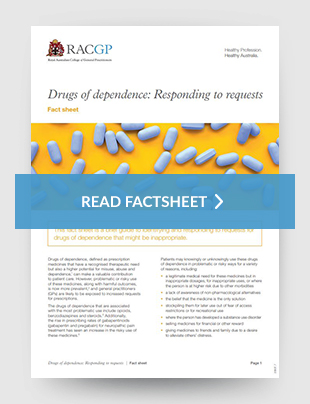A brief guide to identifying and responding to requests for drugs of dependence

Drugs of dependence, defined as prescription medicines that have a recognised therapeutic need but also a higher potential for misuse, abuse and dependence, can make a valuable contribution to patient care. However, problematic or risky use of these medicines, along with harmful outcomes, is now more prevalent, and GP’s are likely to be exposed to increased requests for prescriptions.
There is no single profile for people who develop problematic or risky use of drugs of dependence and patients may knowingly or unknowingly use these medicines in problematic or risky ways for a variety of reasons. Responding to requests for these medicines requires a nuanced approach for each patient.
To assist GPs and practice teams, the RACGP has developed a fact sheet, outlining behaviours suggesting problematic or risky use of these medicines, considerations for responding to requests, available prescription monitoring services and resources and practice wide approaches which may assist in managing requests for drugs of dependence.
Provided under licence
This resource is provided under licence by the RACGP. Full terms are available on the licence terms page.
In summary, you must not edit or adapt it or use it for any commercial purposes.
You must also acknowledge the RACGP as the owner.